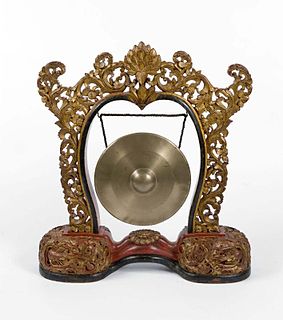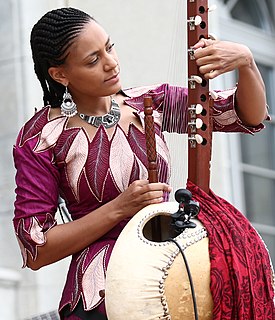Related Research Articles

An orchestra is a large instrumental ensemble typical of classical music, which combines instruments from different families, including

A gong is a percussion instrument originating in East Asia and Southeast Asia. Gongs are a flat, circular metal disc that is typically struck with a mallet. They can be small or large in size, and tuned or can require tuning.
Yaa Asantewaa I was the Warrior Queen Mother of Ejisu in the Ashanti Empire – now part of modern-day Ghana – appointed by her brother Nana Akwasi Afrane Opese, the Edwesuhene, or ruler, of Edwesu. In 1900 she led the Ashanti war known as the War of the Golden Stool, also known as the Yaa Asantewaa War of Independence, against the British Empire.

The balafon is a gourd-resonated xylophone, a type of struck idiophone. It is closely associated with the neighbouring Mandé, Senoufo and Gur peoples of West Africa, particularly the Guinean branch of the Mandinka ethnic group, but is now found across West Africa from Guinea to Mali. Its common name, balafon, is likely a European coinage combining its Mandinka name bala with the word fôn 'to speak' or the Greek root phono.
There are many styles of traditional and modern music of Ghana, due to Ghana's worldwide geographic position on the African continent.

As it is a country with many different tribes and ethnic groups, the music of Indonesia itself is also very diverse, coming in hundreds of different forms and styles. Every region have its own culture and art, and as a result traditional music from area to area also uniquely differs from one another. For example, each traditional music are often accompanied by their very own dance and theatre. Contemporary music scene have also been heavily shaped by various foreign influences, such as America, Britain, Japan, Korea, and India.
Guy Warren of Ghana, also known as Kofi Ghanaba, was a Ghanaian musician, best known as the inventor of Afro-jazz — "the reuniting of African-American jazz with its African roots" — and as a member of The Tempos, alongside E. T. Mensah. He also inspired musicians such as Fela Kuti. Warren's virtuosity on the African drums earned him the appellation "The Divine Drummer". At different stages of his life, he also worked as a journalist, DJ and broadcaster.

The term Chinese orchestra is most commonly used to refer to the modern Chinese orchestra that is found in China and various overseas Chinese communities. This modern Chinese orchestra first developed out of Jiangnan sizhu ensemble in the 1920s into a form that is based on the structure and principles of a Western symphony orchestra but using Chinese instruments. The orchestra is divided into four sections - wind, plucked strings, bow strings, and percussion, and usually performs modernized traditional music called guoyue. The orchestra may be referred to as Minzu Yuetuan or Minyuetuan in mainland China, Chung Ngok Tuen in Hong Kong, Huayuetuan in Southeast Asia, or Guoyuetuan in Taiwan, all meaning Chinese orchestra.
The atenteben(atɛntɛbɛn) is a bamboo flute from Ghana. It is played vertically, like the European recorder, and, like the recorder, can be played diatonically as well as chromatically. Although originally used as a traditional instrument, beginning in the 20th century it has also been used in contemporary and classical music. Several players have attained high levels of virtuosity and are able to play Western as well as African music on the instrument.
Tunde Jegede is a composer and multi-instrumentalist in contemporary classical, African and pop music, who is of Nigerian descent and born in England and as a child travelled to Africa to learn the art of the kora. He is a producer-songwriter and has worked across several genres both as a performer and producer. He is a master kora player, and specializes in the West African classical music tradition which dates from the period of Sundiata. His sister is Sona Jobarteh, who is the first female kora virtuoso to come from a griot family. His father is Nigerian artist Emmanuel Taiwo Jegede.

Sona Jobarteh is a British multi-instrumentalist, singer and composer with Gambian roots. She is from one of the five principal kora-playing griot families of West Africa, and is the first female professional kora player to come from a griot family. She is the cousin of the celebrated kora player Toumani Diabate, and is the sister of the diaspora kora player Tunde Jegede.
Articles related to Ghana include:
The War of the Golden Stool, also known as the Yaa Asantewaa War, the Third Ashanti Expedition, the Ashanti Uprising, or variations thereof, was a violent battle in the series of conflicts between the United Kingdom and the Ashanti Empire, an autonomous state in West Africa that fractiously co-existed with the British and its vassal coastal tribes.
Zachary Carrettin is an American violinist, violist, conductor, and music educator. Carrettin is currently the Music Drector of Boulder Bach Festival.

The National Symphony Orchestra Ghana is the national symphony orchestra of Ghana. NSO Ghana was founded in 1959 by order of Kwame Nkrumah, and established by Philip Gbeho, together with the musician Amihud (Ami) Elroy from Israel who was especially invited to Ghana for the three years establishment mission. NSO Ghana was the only classical symphony orchestra in sub-Saharan Africa outside of South Africa until Orchestre Symphonique Kimbanguiste was created in Congo in 1994.
Peng-Peng Gong, formerly known as his stage name Peng Peng, is a Chinese classical composer and pianist born on July 3, 1992. Described by The Washington Post as an artist "with the confidence of a weathered veteran and a welcome unbridled quality to his playing", he has established himself as one of the most gifted young artists of his generation. At 18, he has become an internationally active concert pianist and a six-time American Society of Composers, Authors and Publishers National Award-winning composer in consecutive years since 2006. He was among the youngest pianists to be officially signed to the artist roster of the renowned Opus 3 Artists in 2007 at age 14, and the youngest composer to be signed by the [Lauren Keiser Music Publishing] in 2009 at age 16. Since 2005, he concertized and toured intensely in the North America, South America, Europe, and China, appearing in over a hundred solo and orchestral engagements. He was invited twice, on personal request, by House Speaker Nancy Pelosi to perform for the United States Congress.
Philip Comi Gbeho was a Ghanaian musician, composer and teacher. He is best known for his composition of the Ghana National Anthem. He was instrumental in the establishment of the Arts Council of Ghana and was a Director of Music and conductor of the National Symphony Orchestra in Ghana.
An African City is a television and a web series, it is created as a Ghanaian equivalent of Sex and the City for YouTube. The first episode of the webseries debuted on March 2, 2014. The second season debuted on January 24, 2016. The series follows the lives of five single young women of African descent who have recently resettled in Accra, Ghana, after living abroad for most of their lives. The series also displays how each woman balance being a successful college-educated woman with their personal lives as well as their new life as "returnees" in Ghana. Each episode is told in first-person narrative through the main character NanaYaa and touches on a wide array of subjects from power outages or skin whitening to condom use, self-gratification and sexual abstinence before marriage.
John William Hansen popularly known as Jerry Hansen was a Ghanaian highlife musician. He was a singer, a composer, an arranger, a saxophonist and a pioneer of highlife music. He was the bandleader and founder of the Ramblers International Band. He was a founding member and the first president of the Musicians Union of Ghana (MUSIGA).
Ivor Agyeman-Duah is a Ghanaian academic, economist, writer, editor and film director. He has worked in Ghana's diplomatic service and has served as an advisor on development policy.
References
- ↑ Baba Abdulai, "Goodbye, Nana Danso Abiam", Weekend Sun, 22 February 2015.
- ↑ Daniel Avorgbedor. "Pan-African Orchestra." Grove Music Online. Oxford University Press. Retrieved 24 February 2014.
- ↑ John Owoo, "Nana Danso Abiam — A true musicial [sic] genius", Graphic Online, 22 April 2016.
- ↑ "Kojo Antwi, others to perform at Abiam’s vigil tonight", Starr FM, 12 March 2015.
- ↑ Kwesi Appiah, "To Nana Danso Abiam", Graphic Online, 7 March 2015.
- ↑ "Press Release: Pan African Orchestra Reviving Itself in 2012", Modern Ghana, 9 November 2011.
- ↑ Agawu, Victor Kofi (2003). Representing African Music: Postcolonial Notes, Queries, Positions. Psychology Press. pp. 19–20. ISBN 978-0-415-94390-1.
- 1 2 Philip Sweeney, "Symphonies for a continent: The Pan African Orchestra uses native instruments to create a novel sound. Philip Sweeney met them in Ghana just before their first European tour", The Independent, 9 August 1994.
- 1 2 Craig Harris, Artist Biography at AllMusic.
- 1 2 Genevieve Ruha, "Nana Danso Abiam", GhanaNation, 18 September 2013.
- 1 2 Lawrence, Ben (13 October 2015). "Nana Danso Abiam & the Pan African Orchestra". Ghana Goods. Retrieved 2 October 2022.
- ↑ Pan African Youth Orchestra website.
- ↑ "Yaa Asantewaa: Warrior Queen", National Theatre, Black Plays Archive.